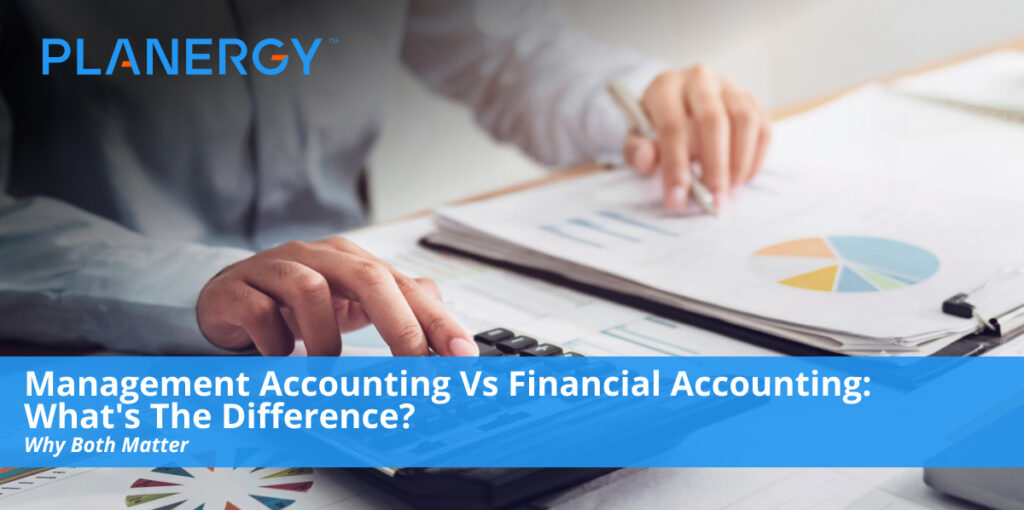Did you know there are multiple types of accounting? Two of the most common are managerial accounting, which sometimes also called management accounting, and financial accounting.
Both of them deal with numbers that that’s where many of the similarities stop.
Let’s take a closer look at the differences between management accounting and financial accounting. We discussed it a bit in our post about managerial versus financial reporting. Business owners need both types of accounting for success.
What is Managerial Accounting?
Managerial accounting refers to the finances and accounting tasks surrounding the internal needs of a business.
Managerial accounting is the internal process is used to account for business transactions. Certified Management accountants are trained in managerial accounting.
The main focus of managerial accounting is your internal business needs. If you find that your top salesperson notifies you that one of his accounts is closing their business at the end of the year, it is the managerial accounting side of things that helps develop a plan to offset the loss.
Managerial accounting looks at the entire company systems and reviews processes to find bottlenecks in the operation and seeks to find ways to improve profits by getting rid of those issues.
The information managerial accountants discover helps guide business decisions in nearly every aspect of a company. These accountants give their work directly to managers and other decision-makers within an organization.
Managerial accounting reports cover future projections, concern category breakdowns, cost of an organization’s products and services, budges, and performance reports.
Performance reports compare budgets with actual results and help businesses to determine how well their initiatives have reached their goals.
Managerial accountants produce profit-and-loss statements, job costing reports, operating budgets, and more. These reports are for internal operations which help guide decision making at the company-wide and department levels.
What is Financial Accounting?
Financial accounting, on the other hand, refers to the external. While there are some internal uses for it, it’s most commonly used to share information about a company with people outside of it.
In financial accounting, you collect actual (not estimated) accounting data to create financial statements, which are then shared with investors, creditors, and others who need access to the information.
People who have been trained in financial accounting and earn certification are known as certified public accountants or CPAs.
For public companies, financial accounting processes have to follow a specific set of rules provided by the generally accepted accounting principles (GAAP) which is the accounting standard adopted by the United States Securities and Exchange Commission (SEC) framework.
The SEC also has additional rules for publicly held companies that have to be followed, too.
GAAP accounting principles, standards, and procedures are issued by the Financial Accounting Standards Board, or FASB. at the international level, the equivalent to GAAP in the United States is known as International financial reporting standards (IFRS).
If you operate a multinational organization, working with an accountant who is familiar with IFRS ensures you remain compliant with all rules and regulations that apply to your business.
GAAP’s main objective is to ensure financial statements are consistent, comfortable, and complete to make it easier for investors to analyze the information.
Financial accounting focuses on generating a profit rather than the overall system of how the company works.
It’s based on a chart of accounts created for the company, with set procedures and policies in place that determine how transactions are posted using these accounts with the end goal of creating financial statements for a period of time.
The financial accounting process also includes routine tasks such as creating invoices and tracking accounts receivable balances.
Financial statements are due at the end of accounting periods, generally quarterly and annually. Common financial accounting reports include:
- Balance Sheet: A snapshot of your business finances as it currently stands. It lists the assets you own and the debts you owe at that particular point in time. How often you have one of these reports depends on your business. If you move a lot of money, you may get them daily, but if you’re a fairly small business you may only get them once every quarter.
- Income Statement: This is also known as the profit and loss statement, or P&L statement. It shows you how profitable your business was for the accounting period. It shows how much money you made and how much you spent.
- Cash Flow Statement: This document, also known as the statement of cash flows, is generally only prepared for companies that use the accrual accounting method. A company’s income statement may include revenue the company hasn’t yet received, and expenses a company has incurred but hasn’t paid. If your business uses the cash accounting method of recording expenses as they are received and paid, then you don’t necessarily need this statement.
Following GAAP is not required for non-publicly traded companies, but many lenders and creditors can look at it favorably.
The majority of financial institutions will require annual GAAP compliant financial statements as part of their debt covenants when issuing a business loan. Because of this, most companies in the US do follow the standards.
Financial statements that aren’t prepared using GAAP make it difficult for investors to compare different companies even within the same industry.
Managerial accounting focuses on problems and solutions within a company. Financial accounting focuses on profitability from the outside.
Differences Between the Two
Managerial accounting is used for internal purposes only but financial accounting provides financial information based on accounting standards.
While financial accounting analyzes historical data, managerial accounting often looks ahead. Accuracy and precision of numbers and data are more important for financial accounting, since managerial accounting focuses on estimates rather than fact.
Financial statements are due at the end of an accounting period. But managerial reports are issued more frequently so that managers have relevant information they can act on quickly.
Financial accounting focuses on profit generation, managerial accounting focuses on improving processes and efficiency to earn more profit.
Financial accounting looks at the entire business, but managerial reports look at the business on a more detailed level. For instance, you can get reports on profits by product or product line, or by a customer, or even geographic region.
Financial reports are aggregated, generalized, and concise, where managerial accounting reports are highly technical, specific, and detailed. Many times, they are also experimental as they are used to help companies find their competitive advantage. Because of this, much of the information may seem confusing or irrelevant to outsiders.
That said, when dealing with internal reports, it may be wise to report lower bonuses to avoid upsetting your mid to lower-level employees who may wish to review the report.
Managerial accounting is made for internal purposes, there is no set of standards to compile the information.
Financial accounting has to follow various accounting standards at the global, federal, and state levels. though privately held companies are not subject to the same rules and regulations as publicly traded companies, many of them cops follow the same accounting standards for investors and lenders.
When comparing financial accounting vs. management accounting, you’ll often find that most businesses use them both, even if they don’t realize it.
Keeping an eye on your company’s financial health is crucial all the time – not just when looking for a business loan or considering introducing a new product line.
Your financial activity is important for both managerial and financial accountancy. It helps ensure the financial data presented in corporate finance reports is accurate for external stakeholders. It also helps ensure projections are accurate based on current numbers and past performance.
To be a truly successful company, you need both impeccable managerial and financial accounting.
By implementing suggestions from the managerial side of things, you can help your company run more effectively, and efficiently to increase profitability.
By using financial Accounting to inform lenders an investor, you can set yourself up for growth year-over-year. though the two types of accounting have different focuses, healthy businesses of all sizes rely on both forms to remain competitive.




